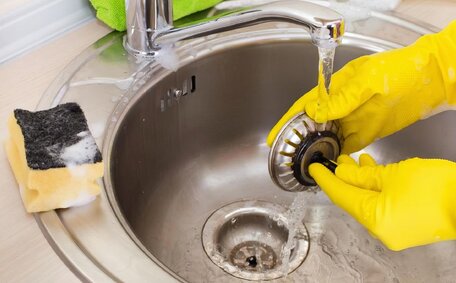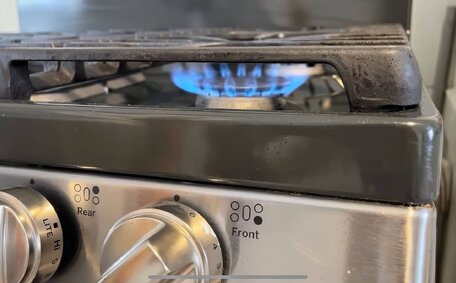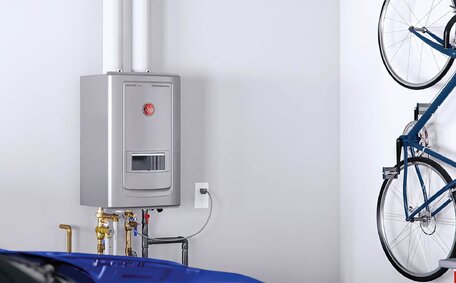Introducing heat pump hot water systems
As a premier Pennant Hills plumbing company, we recognise the increased demand for eco-friendly hot water solutions. Heat pump hot water systems, harnessing advanced heat pump technology, are an excellent eco-friendly option to consider for your home.
A system heat approach is employed by hot water heat pumps using renewable thermal energy from the surrounding air, making them significantly more energy-efficient than traditional systems. These systems can slash energy bills by up to 65%, offering an energy-efficient solution that also minimises your carbon footprint—an excellent alternative to conventional electric water heaters.
Our expertise extends to the installation and servicing of heat pumps and solar hot water systems from top manufacturers. Properly sized and installed, a heat pump hot water system delivers the comfort and convenience of traditional systems with reduced operating costs and environmental impact.
There are also great government incentives for energy upgrades, including rebates available in NSW to help with the initial purchase price. Our team can provide insight into your household’s hot water requirements and advise if systems designed with water heat pump technology are suitable for your needs.
With water heat pump systems technology advancing continuously, now is a great time to explore this sustainable water heating option. For a no-obligation free quote and expert advice, contact us today to book an onsite assessment from one of our qualified plumbers.
How do heat pump hot water systems work?
Heat pump hot water systems operate differently compared to traditional electric gas water systems. They use a compressor and refrigerant gas to absorb heat from the air around the unit, transferring it to the water inside the storage tank.
The key components are:
- An outdoor air-source heat exchanger equipped with a fan compressor unit and coil, designed to efficiently transfer heat to the system. The system uses air-to-air heat exchange to harness heat from the environment.
- A compressor which facilitates the heat exchange by pressurising the refrigerant gas.
- A heat exchanger housed within the water tank, where hot compressed gas astonishingly transmits its heat to the water.
- An expansion valve to reduce the refrigerant pressure after releasing the heat.
So unlike traditional systems, hot water systems use the innovative approach of harnessing renewable thermal energy present in the air. This significantly lowers energy consumption, making power heat pump units much more energy efficient - using as little as 60-80% of the electricity traditional systems require for water heating.
Consider how much a 300L heat pump hot water system can typically save a household—around $300 annually on energy bills over time, compared to a traditional electric hot water system. And by lowering energy use, thereby generating fewer carbon emissions, they are also better for the environment.
Energy efficiency and cost savings
Heat pump hot water systems are vastly more energy efficient than conventional electric or gas storage systems. They can be over 300% more efficient compared to traditional electric hot systems, translating into significant savings on your energy bills.
Whilst traditional systems, which are more costly, use electricity or gas for direct water heating, heat pumps exploit renewable ambient heat. This means they consume much less purchased power - around a quarter compared to electric storage heaters.
For an average family, transitioning to a less energy-intensive heat pump system could cut annual water heating costs by $300 or more. Over a system’s lifetime of 15+ years, your household could pocket energy savings of $5,000 or higher.
The carbon emissions produced per year are also slashed considerably, making heat pumps a sustainable, environmentally-friendly technology for the future.
With a typical heat pump hot water system tailored to your home’s needs, costing $2,000-$3,500 installed, the investment pays itself back quite quickly through lower energy bills. Furthermore, Federal Government STC rebates enhance their cost-effectiveness.
When correctly sized and installed, hot water systems can supply all your household’s needs through a heat pump, offering a cheap run and reducing your bills, carbon footprint, and reliance on fossil fuels.
Environmental benefits
Heat pump hot water systems offer notable environmental advantages over traditional water heating methods that rely on electric and gas. As they use renewable thermal energy from ambient air, thereby reducing energy dependence on electricity or gas, they have a much lower carbon footprint.
A typical heat pump water heater produces 60-70% less greenhouse gas emissions than an electric storage system. Consuming up to 45% less electricity than gas heaters, they also contribute to reduced emissions. This helps households minimise their impact on climate change.
Heat pumps can effortlessly mesh with solar hot water setups, including those that may incorporate an off-grid pv system with batteries and a solar panel array. This setup can allow 100% solar power use for water heating and general household needs, for zero net emissions.
Even sans solar panels, heat pumps reduce grid-reliant fossil fuel consumption, enhancing their sustainability for the future. With lower energy bills as a bonus.
With rising energy costs and environmental awareness, australian hot water systems like heat pumps are becoming increasingly appealing. Their green credentials and efficiency offer households the ability to do their part for the planet, while saving money at the same time.
Government rebates and incentives
There are excellent incentives available from the new south Wales state government and Federal Government for installing a heat pump hot water system. These incentives boost the appeal of this energy-efficient technology which can even more significantly lower costs.
Federal rebates
The Federal Government’s Small-scale Renewable Energy Scheme (SRES) offers generous rebates for households who install solar or heat pump hot water systems.
You should consider claiming Small-scale Technology Certificates (STCs) when you purchase an eligible heat pump model. Each certificate represents 1 megawatt hour of renewable energy generation.
The number you receive depends on factors like your location climate zone and the storage capacity. For a 270L heat pump in Sydney, you would typically get around 18 STCs at present, worth over $900 off the total cost.
NSW rebates
Find out about great rebates, like those from Solar Victoria, offered by the NSW Government to assist households in installing a solar hot water system, which is more energy-efficient.
Their Energy Saving Scheme provides reduced installation costs for heat pump water heaters from accredited suppliers, including Pennant Hills Plumbing. You can save around $500 off the total installed price.
Combining these state and federal rebates can slash $1,400 off the total cost - making water heat pumps a very attractive option for most homes.
And that’s on top of the long-term savings on your energy bills. Contact us to check your eligibility and get your hot water system upgraded today.
Installation considerations
Installing a heat pump hot water system requires some planning to ensure it operates efficiently and meets your household’s needs.
Space requirements
Heat pumps require sufficient airflow around the outdoor unit, typically installed on an exterior wall or the ground. Clearance of at least 300mm on all sides is recommended by manufacturers.
Structural factors
It’s necessary to factor in the existing pipework and 240V power supply to seamlessly connect the heat pump tank. Your chosen installer can advise on the best setup for your home.
System sizing
Choosing the best water storage tank capacity for your needs is crucial, ensuring the system can handle peak demand without requiring electric heating backup. Selecting the proper heat pump size reduces running costs, while an undersized unit may incur higher expenses.
Our plumbers will assess your hot water usage to help choose the best system size for your needs.
Professional advice
Given the technical complexities, consulting an experienced plumber before installing a heat pump system is highly recommended. This ensures that your investment is wisely made.
As Sydney heat pump specialists, Pennant Hills Plumbing offers free on-site consultations. We carefully evaluate how heat pump systems can be tailored to suit your home’s unique requirements.
Maintenance requirements
While generally low maintenance, heat pump hot water systems benefit from periodic servicing for optimal efficiency.
An annual tune-up and inspection by a licensed technician are recommended for heat pump systems. This proactive measure allows any concerns about heat pump performance to be identified early.
Air filter cleaning
Much like an air conditioner, the air filters on the external fan coils should be checked and cleaned every 6 months. Clogged filters may impede efficiency and restrict airflow.
Scale reduction
Hard water can cause limescale buildup inside the heat pump’s heat exchanger, affecting the heating of water while reducing efficiency. A de-scaling solution used by our plumbers can help remove this, restoring your heat pump’s efficient heating performance.
System monitoring
During the yearly service, we’ll check refrigerant levels, inspect all components for wear/damage, and ensure correct water pressure and temperature to maintain an efficient heat pump operation. Such maintenance is key for maintaining maximum efficiency.
Regular maintenance by Pennant Hills Plumbing ensures your heat pump hot water system offers 15-20 years of dependable and energy-efficient functionality.
Choosing the right system for your home
Determining which hot water system, particularly a heat pump model, is most suitable for your household requires careful consideration of several key factors:
Household size
Take into account the number of residents and typical patterns of water supply usage. More people or heavy users need a larger storage capacity (litres).
Climate zone
Colder regions require higher heating outputs. Check manufacturers’ climate zone guides or speak to our plumbers to match capacity to your local conditions.
Physical dimensions
Measure potential installation areas to guarantee that the system fulfils your water needs, fitting both the outdoor and indoor units. Respect the clearance dimensions stipulated by the brand.
Existing infrastructure
Evaluate the compatibility of your current plumbing and electrical connections with the heat pump placement.
Budget
Compare models across different price points to find one that provides the power, features and warranty coverage you need.
With heat pump hot water systems becoming increasingly sophisticated, contact Pennant Hills Plumbing for advice on finding the optimal system to come into your home and budget.
Our plumbers provide complimentary on-site consultations to gauge your personal household needs and recommend the best heat pump solution to reduce your energy costs and environmental impact.






